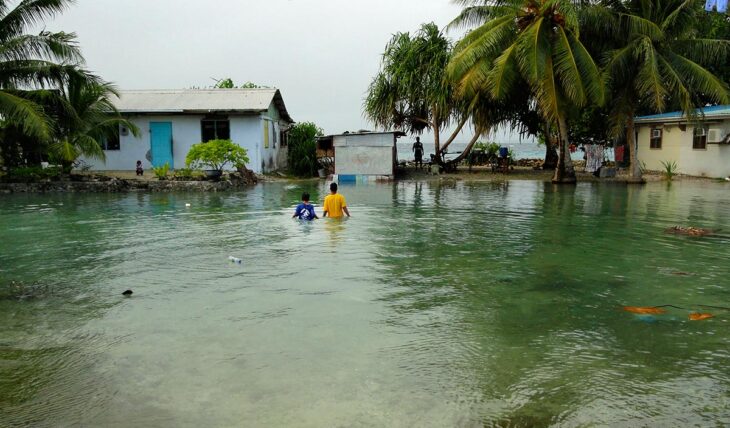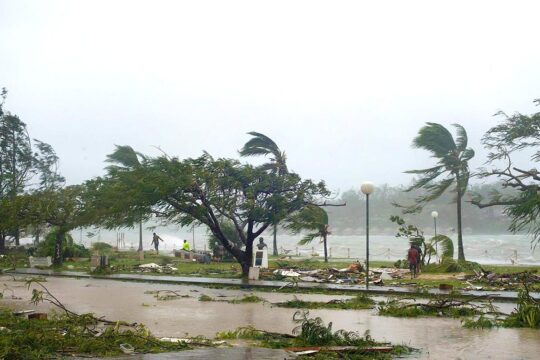WHY THOSE EXPERIENCING "CLIMATE HELL" ARE TAKING THEIR CASE TO THE UN COURT
Those whose feet are already in the water, in the Pacific, have opened a front in the battle for climate justice before the International Court of Justice (ICJ) in the Netherlands. Solicited by a resolution of the United Nations General Assembly, this Court will have to deliver an opinion with potentially major legal consequences, explains the author.
16 JUNE 2023 BY GÉRALDINE GIRAUDEAU,
FOR THE CONVERSATION FRANCE

Two residents of Majuro Atoll, the capital of the Marshall Islands, make their way through areas flooded by extreme tides on 20 February 2011. © Giff Johnson / AFP
On March 29, 2023, the United Nations General Assembly adopted by consensus a resolution requesting the opinion of the International Court of Justice (ICJ) on state obligations in relation to climate change. The resolution, initiated by Vanuatu, marks a decisive step from both a legal and political point of view.
Legally, the resolution poses two very general questions for the ICJ, the main judicial body of the United Nations. The Court is called to rule on States’ obligations to combat climate change "for the benefit of States and future generations", but also on the legal consequences for those who violate these obligations.
In other words, this raises the delicate question of the responsibility of greenhouse gas emitters for damage caused to other States, in particular small island developing States, as well as to the peoples and individuals affected.
Politically, the collective support for the text is a strong signal, albeit with limits. At the same time, it is emblematic of the new visibility of Oceania, and of a narrative shift: those experiencing "climate hell" have become actors pushing for change.
THE AMAZING CAMPAIGN OF PACIFIC STUDENTS
The General Assembly's approval is first and foremost a victory for civil society; coincidentally, the same day saw the opening of hearings before the European Court of Human Rights (ECHR) in another case, that of the "Swiss pensioners" of the Elders for Climate Protection group.
It all began four years ago in a classroom at the University of the Pacific, on the campus of Port-Vila, the capital of Vanuatu. A few students, with the help of their supervisors, took up the aborted project of Palau and the Marshall Islands, which had tried in 2011 to bring the case before the ICJ.
A decade later, the context is more favourable and, above all, the campaign of the Pacific Islands Students Fighting Climate Change is particularly active. In a part of the world where the effects of climate change have long been felt, the determination of those concerned is serious.
A PETITION TAKEN UP BY VANUATU
Vanuatu, a small Melanesian island state, is particularly prone to disasters, as this year's news tragically reminded us (a state of emergency had to be declared following the two-day passage of cyclones Judy and Kevin in March 2023).
The Vanuatu government then took up the young people's petition on an interstate level. At their 51st meeting in Suva, Fiji, in July 2022, the members of the Pacific Islands Forum (PIF) officially endorsed the request at the UN, and eventually won the support of the majority of the world's states.
This is the first time that a resolution requesting an ICJ opinion has been adopted by consensus, and at a time of crisis for multilateralism, this cohesion is not insignificant. However, its scope needs to be clarified.
CLARIFYING THE OBLIGATIONS OF STATES
Article 96 of the United Nations Charter provides that the General Assembly or the Security Council "may request the International Court of Justice to give an advisory opinion on any legal question".
Such opinions, given within the framework of the Court's advisory jurisdiction, have no binding legal force, but are not without effect. They have a very high moral authority and contribute to the development of the law by providing essential elements of interpretation.
In this case, the Court could give its opinion within the next two years, thereby clarifying the obligations of States in the field of climate change, in particular their obligation to cooperate.
The aim, moreover, is to influence the positions of the parties during negotiations under the climate regime, helping to boost ambitions and provide legal arguments for the most vulnerable states. Such an opinion is also likely to clarify the relationship between climate law and other areas of international law, in particular the protection of human rights and the law of the sea.
The text of the resolution refers not only to the UN Framework Convention on Climate Change and the Paris Agreement, but also to a variety of instruments, such as the 1966 Covenants on Civil and Political Rights and on Economic, Social and Cultural Rights, and the Montego Bay Convention.
RISK OF RESISTANCE
The more precise and substantiated the judges' opinion, the more likely it is to be effective at national level, by being taken up by domestic judges, particularly when they are approached by civil society on climate issues.
An ICJ opinion will not be enough, and the initiators of the project are themselves perfectly aware of this, as illustrated by the speech of Vanuatu’s Prime Minister Alatoi Ishmael Kalsakau.
First of all, consensus does not mean unanimity of views. It was a pleasant surprise to see that the United States did not oppose it, whereas it had been feared like with China that it would ask for a formal vote.
The US representative, in his statement after the text was adopted, nonetheless voiced his government's "very serious concerns", arguing that a judicial process could complicate collective efforts, to the detriment of diplomatic channels.
THE RISK OF "SOFT" ANSWERS
Secondly, the judges' task will not be an easy one. The 26 opinions handed down by the ICJ, the most recent of which concerned the Chagos Archipelago, have met with varying degrees of success, not only because of the political contexts surrounding these cases, but also because the answers provided depend on the questions posed.
In this case, the questions posed by the resolution are particularly wide-ranging. First formulated by the legal advisors, they then pass through the filter of modifications discussed by the UN members supporting the text, and are thus the result of compromises.
This leaves room for the judges in The Hague to add more or less substance. However, responses that are too "soft" with regard to States' climate obligations could have detrimental effects, and thus run counter to the objective pursued.
The final risk is a clash of procedures, with two other international jurisdictions having recently been called upon.
A CLASH OF PROCEDURES?
In December 2022, the International Tribunal for the Law of the Sea (ITLOS) received a request for an opinion from the Commission of Small Island States on Climate Change and International Law - created by Tuvalu and Antigua and Barbuda specifically to be able to seize the Tribunal - on State obligations to protect the marine environment, in relation to climate change, under the Law of the Sea Convention.
In January 2023, Colombia and Chile requested an opinion from the Inter-American Court of Human Rights on State obligations to combat climate emergencies, under international human rights law. These interventions could usefully complement each other, but they could also, to a certain extent and in view of the timetables, diverge on certain points.
In pushing the UN to take an important step towards climate justice, the Pacific voices and those who have joined them have chosen to believe that the balance of benefits and risks is in their favour. While we can only have reasonable expectations, the ICJ's perspective on the challenge of the century could well be a significant contribution.
This article, translated by Justice Info, is republished from The Conversation under a Creative Commons licence. Read the original article.
RECOMMENDED READING

VANUATU BRINGS CLIMATE JUSTICE TO THE ICJ
PODCAST

Géraldine Giraudeau is Professor of Public Law at the Université de Versailles Saint-Quentin-en-Yvelines (UVSQ) - Université Paris-Saclay, in France. She taught for several years in the Pacific, notably at the University of Waikato in New Zealand, and devotes a significant part of her research to this region.
No comments:
Post a Comment